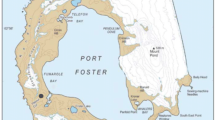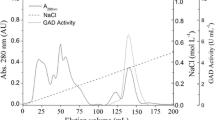Abstract.
Glutamate dehydrogenases (GDHs) from freshwater and marine hyperthermophilic Archaea were compared with respect to their responses to different salt concentrations. A gene encoding GDH from the terrestrial hyperthermophilic archaeon Thermococcus waiotapuensis (Twaio) was cloned, sequenced, and expressed at a high level in Escherichia coli. The deduced amino acid sequence, which consists of 418 amino acid residues, revealed a high degree of similarity with GDHs from related marine strains such as Thermococcus litoralis (Tl) and Pyrococcus furiosus (Pfu). Recombinant Twaio GDH was purified 27-fold to homogeneity. The enzyme is hexameric with a molecular weight of 259,000. The effects of several salts (KCl, CaCl2, MgSO4), temperature, and pH on enzyme activity were determined and compared in three hyperthermophilic GDHs, including T. waiotapuensis, and GDHs from two marine species, T. litoralis and P. furiosus. Kinetic studies suggested a biosynthetic role for the nicotinamide adenine dinucleotide phosphate- (NADP-) specific Twaio GDH in the cell. Interestingly, Twaio GDH revealed no salt responses, whereas the two marine GDHs showed substantial enhancement of activity as well as thermostability at increasing salt concentrations. Because electrostatic interactions between charged amino acid residues are thought to be a key feature of structural integrity and thermostability in hyperthermophilic GDHs, salt availability and its effects on marine enzymes could partially explain a higher thermal stability in marine species than in phyletically related freshwater species.
Similar content being viewed by others
Author information
Authors and Affiliations
Additional information
Electronic Publication
Rights and permissions
About this article
Cite this article
Lee, MK., González, J.M. & Robb, F.T. Extremely thermostable glutamate dehydrogenase (GDH) from the freshwater archaeon Thermococcus waiotapuensis: cloning and comparison with two marine hyperthermophilic GDHs. Extremophiles 6, 151–159 (2002). https://doi.org/10.1007/s007920100238
Received:
Accepted:
Issue Date:
DOI: https://doi.org/10.1007/s007920100238




